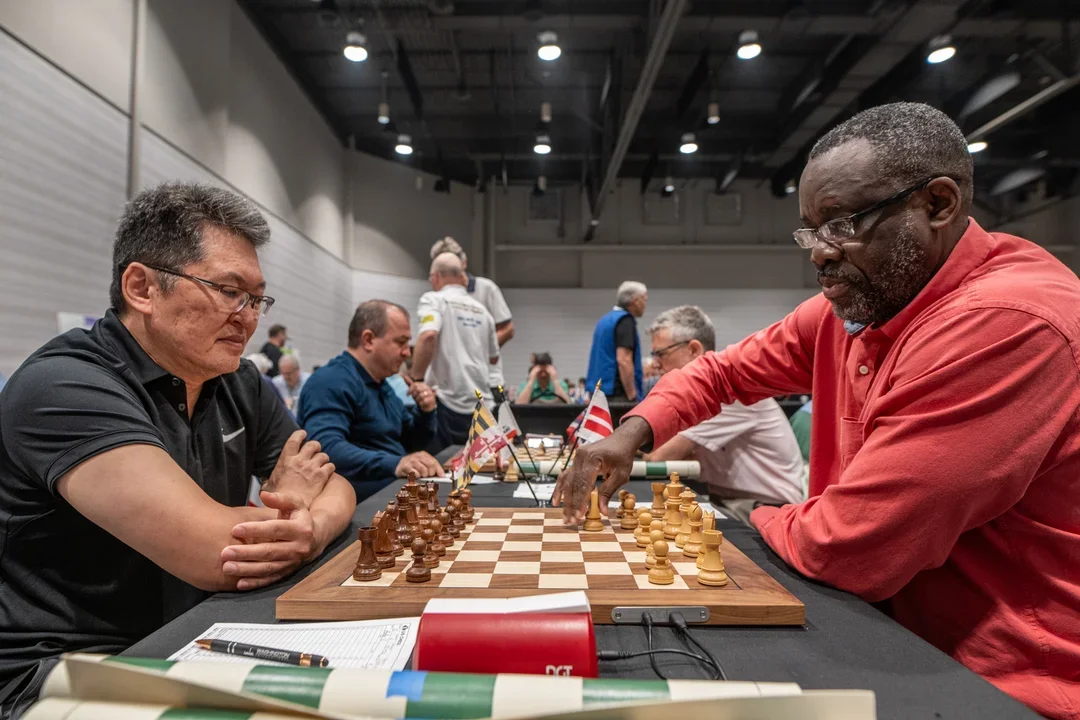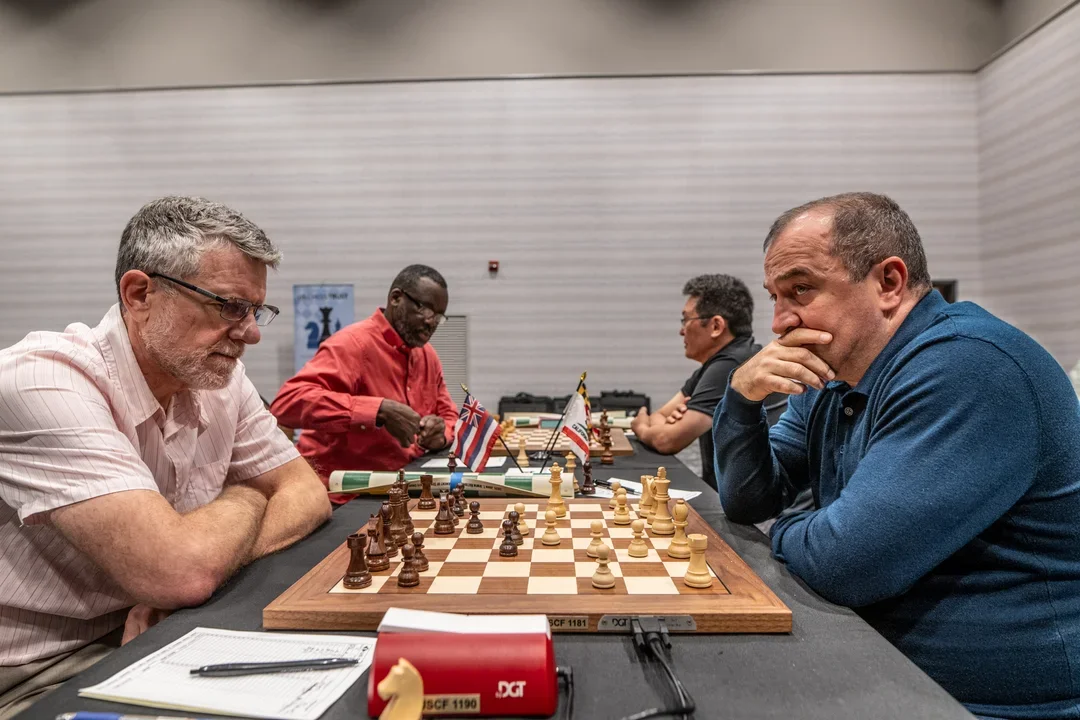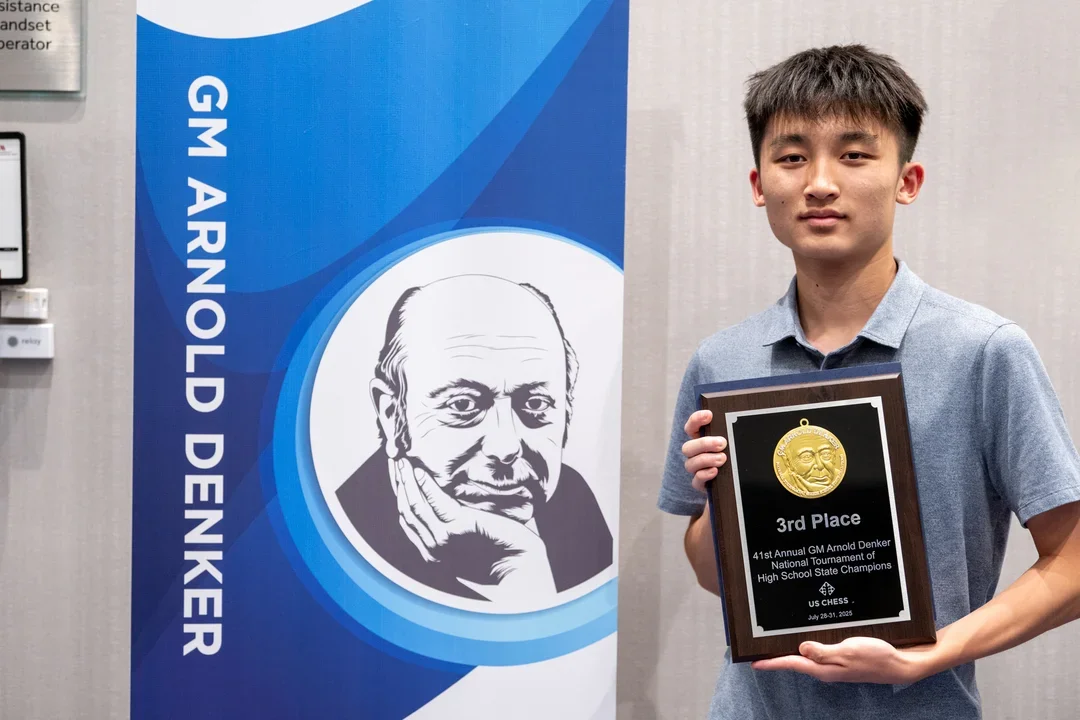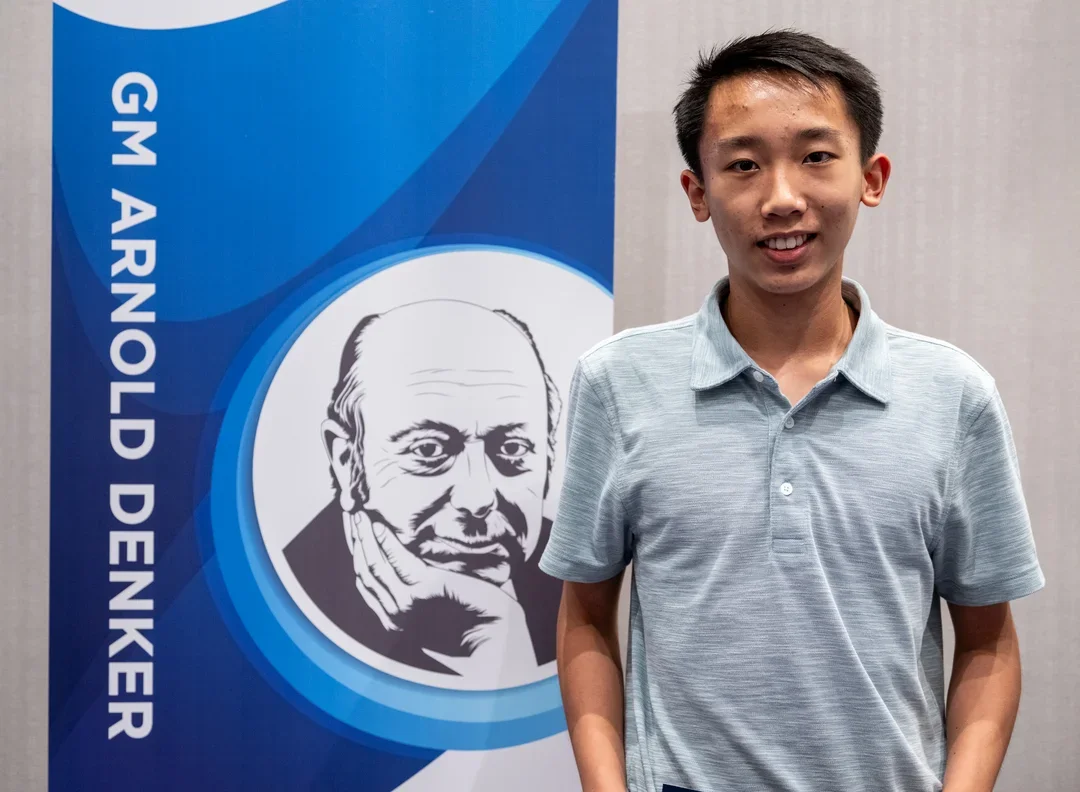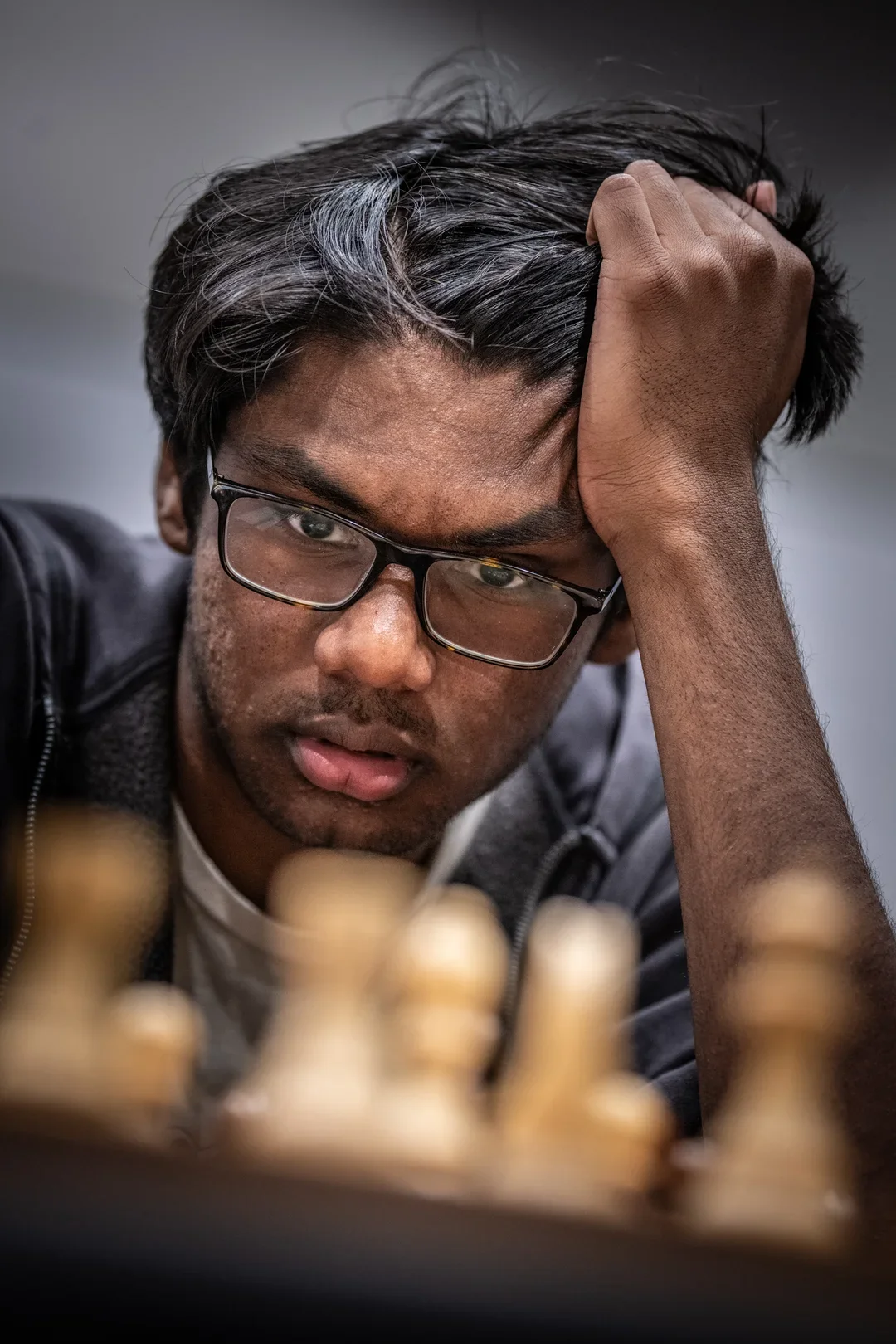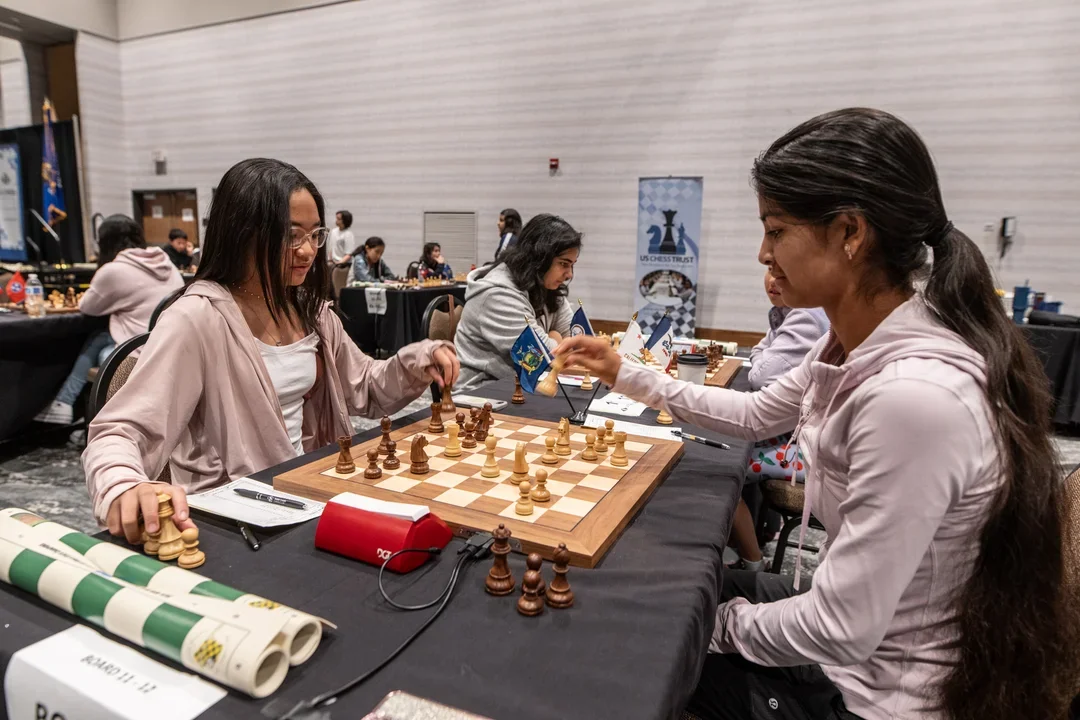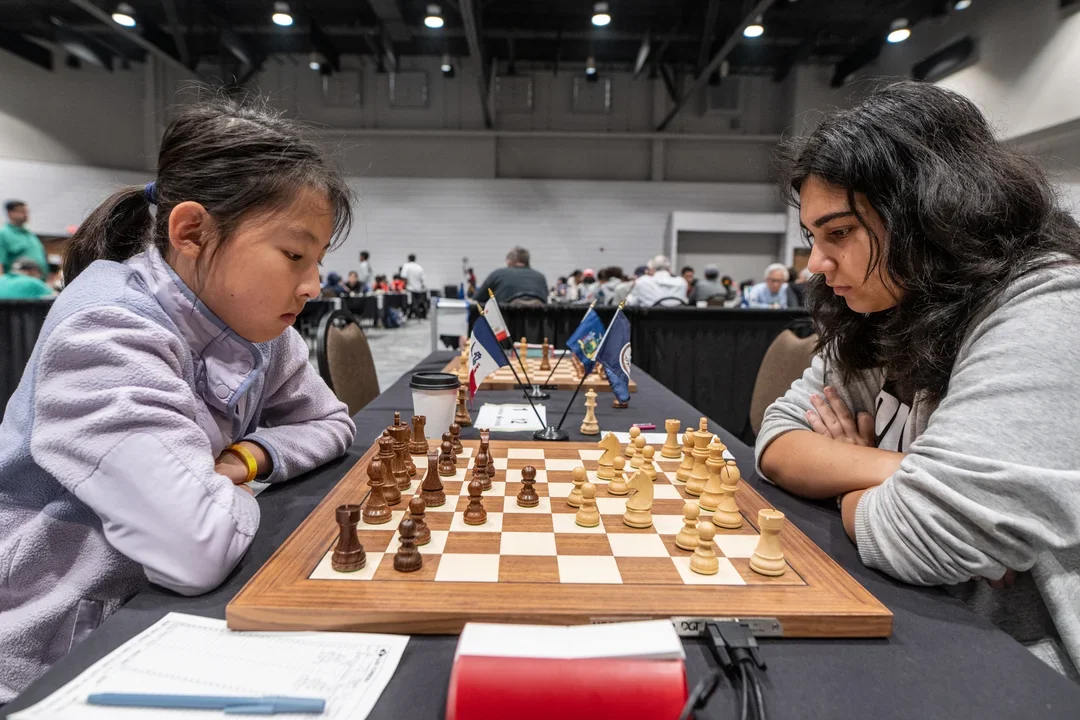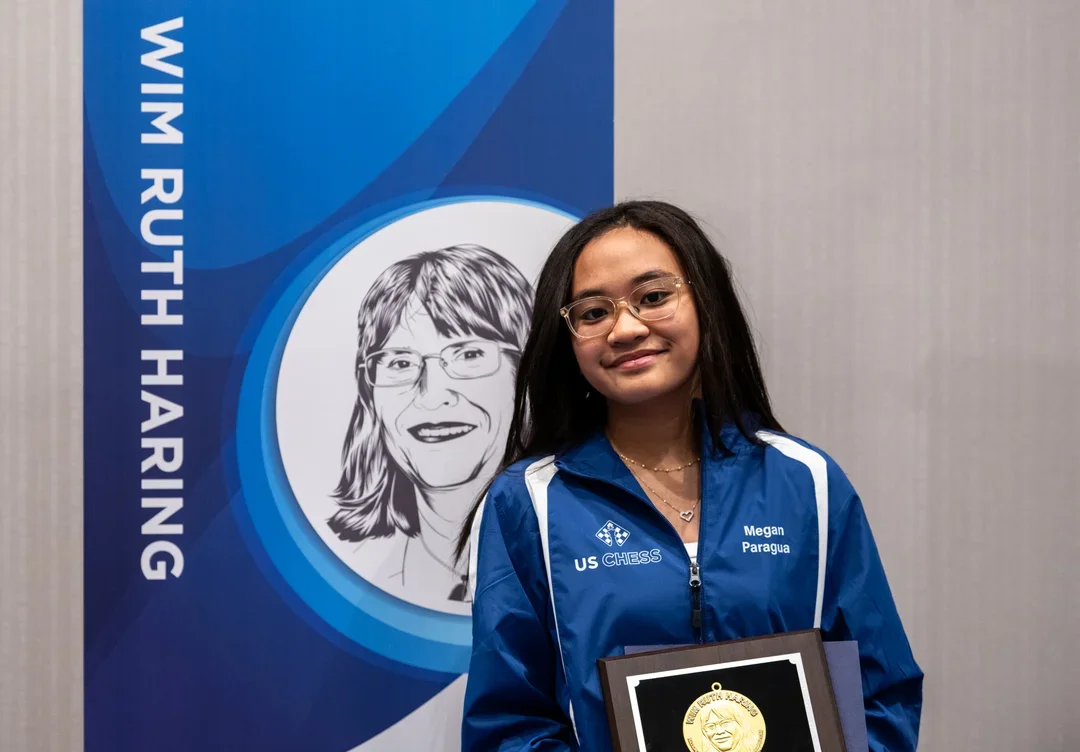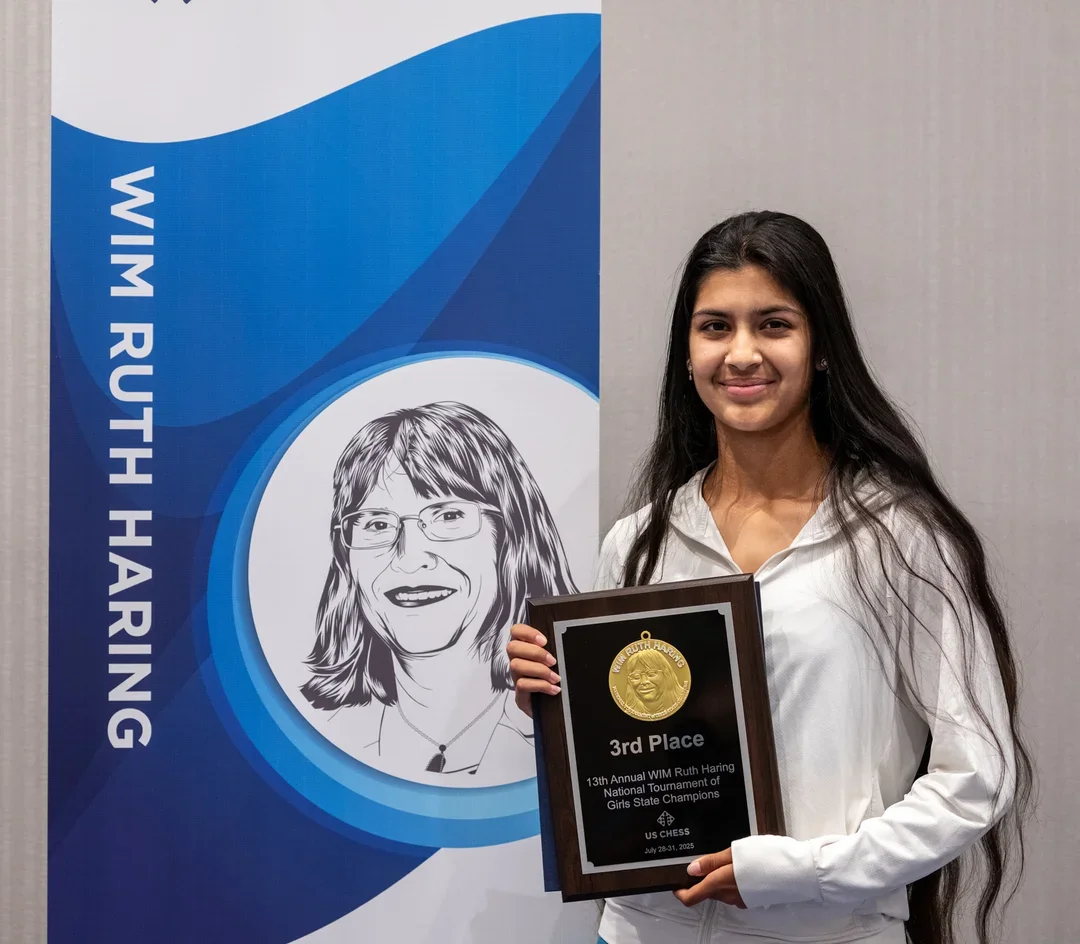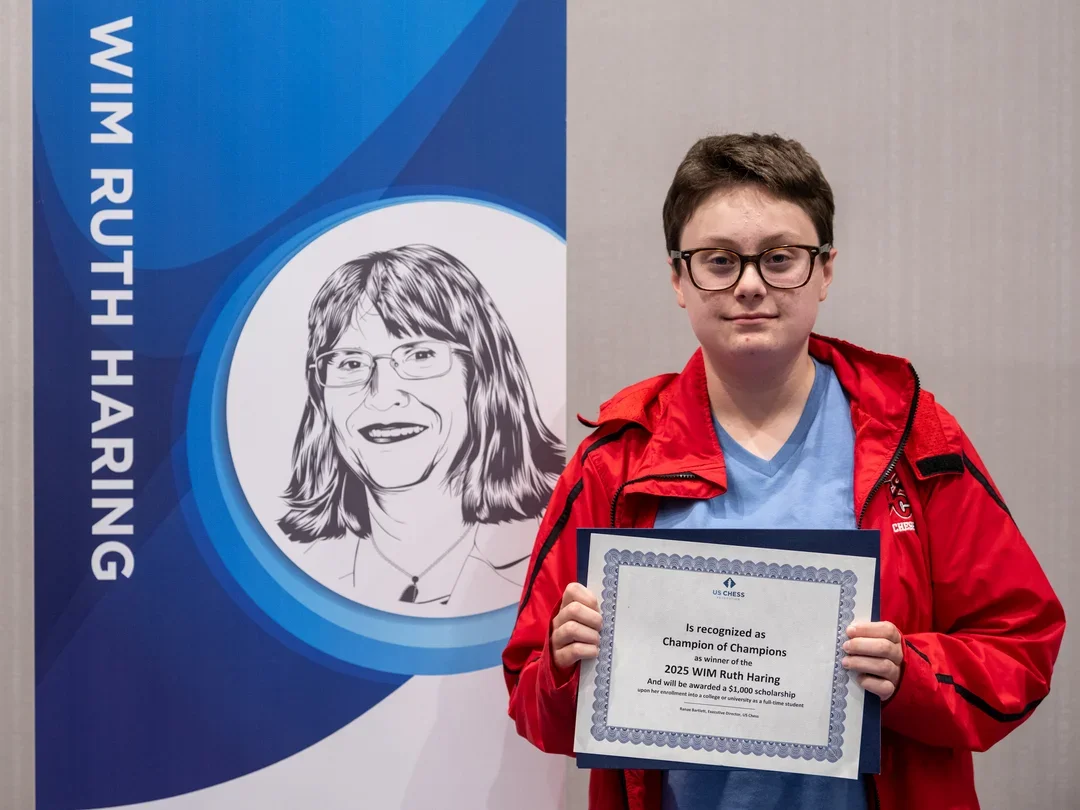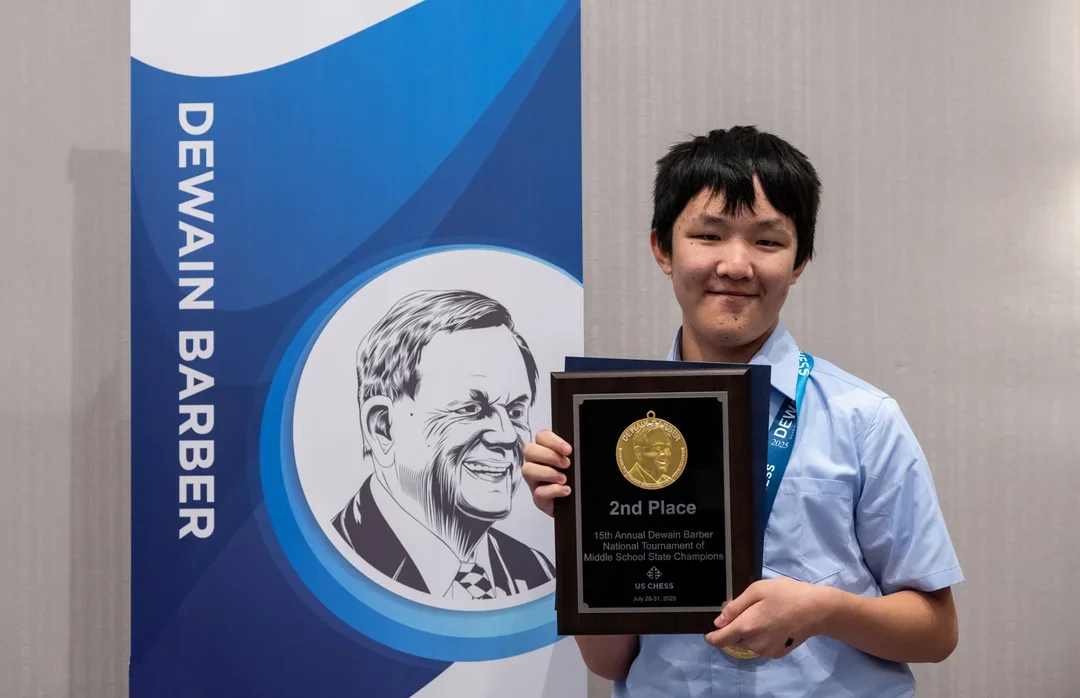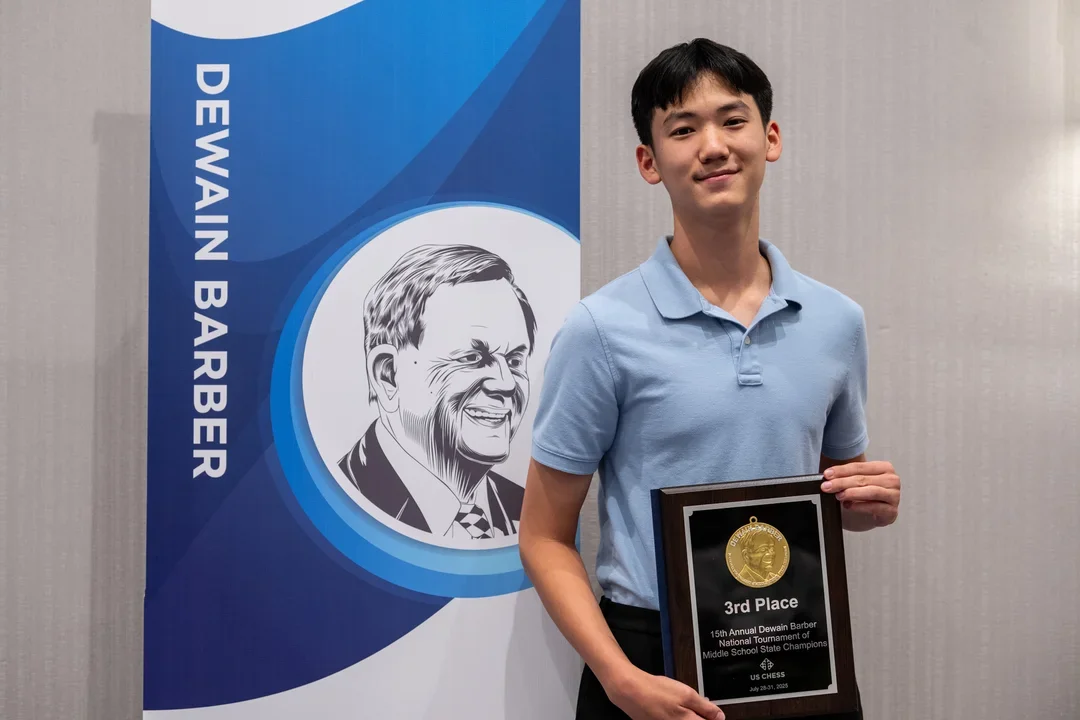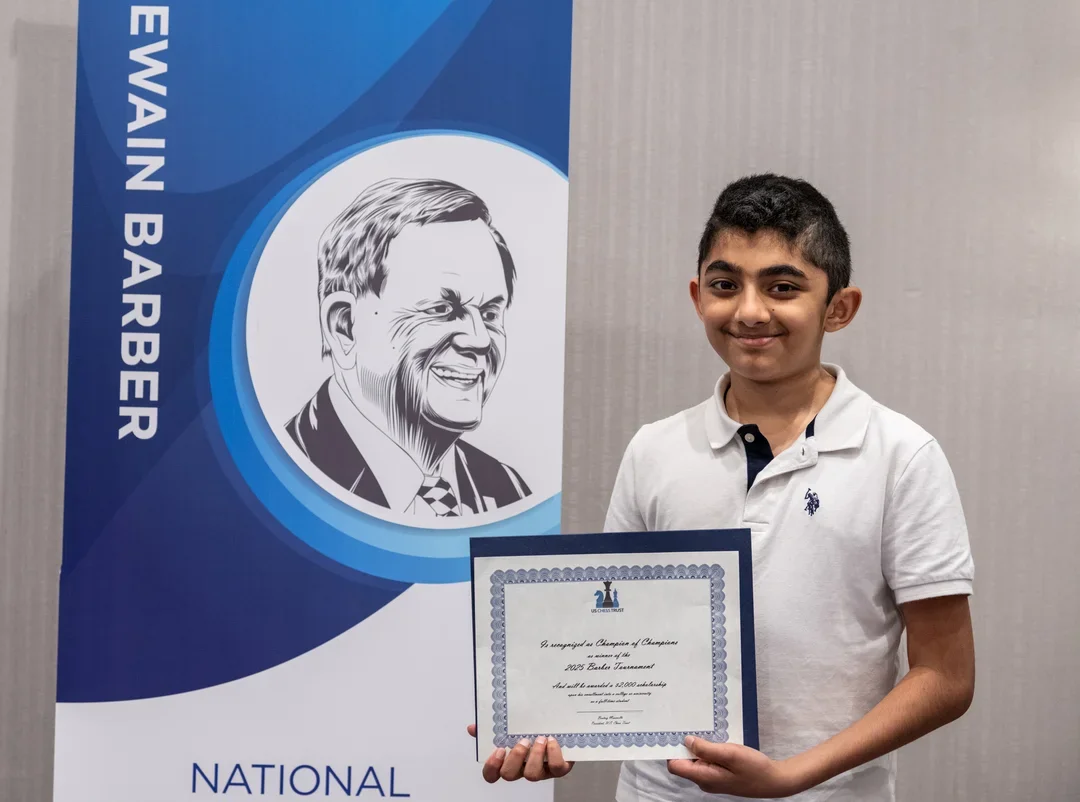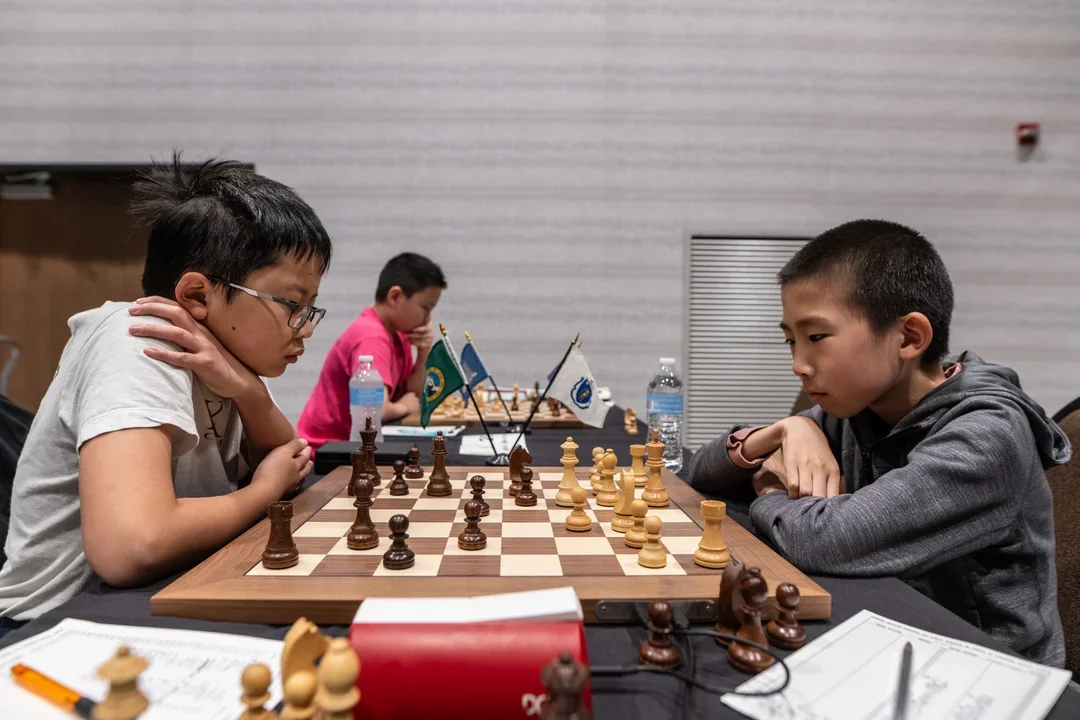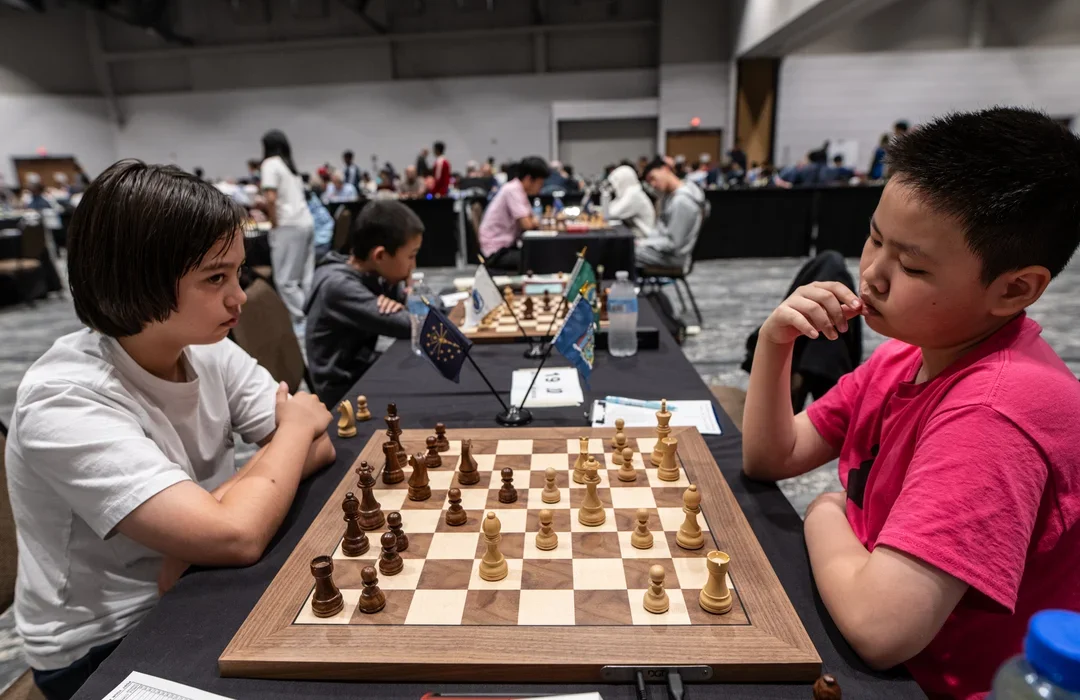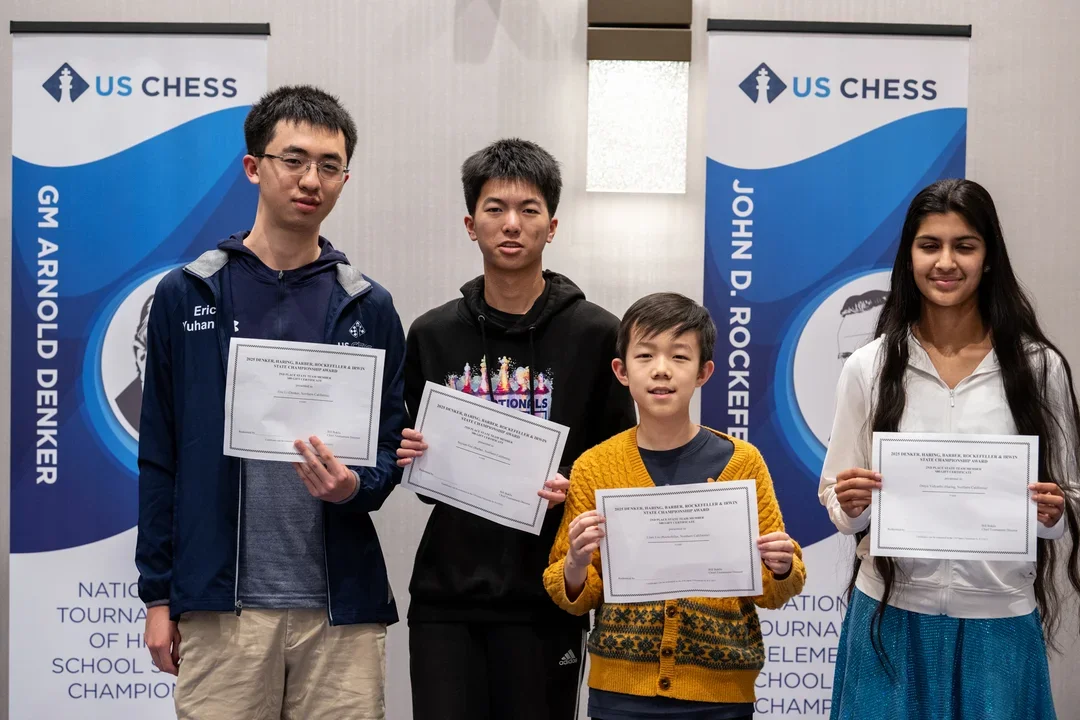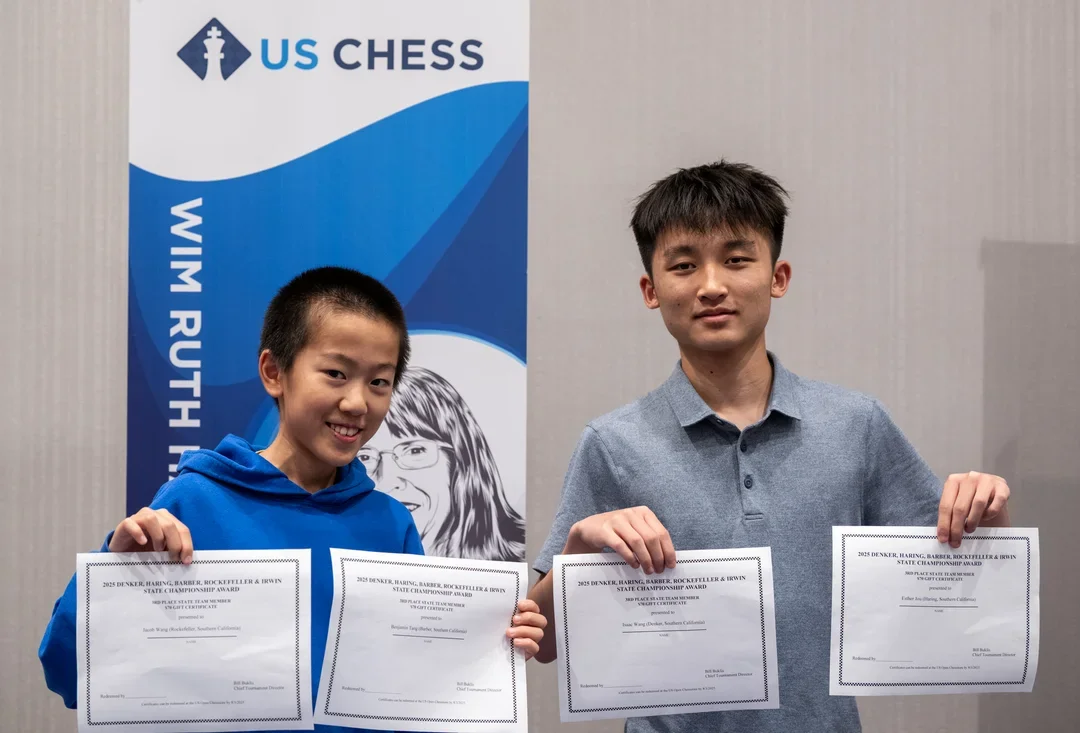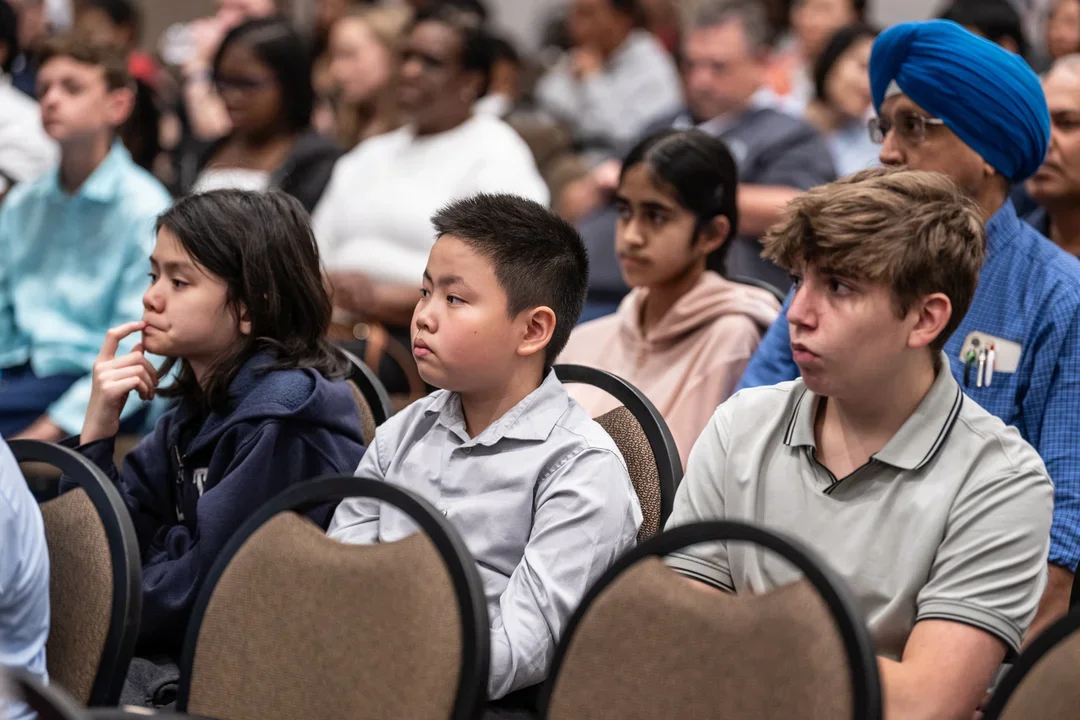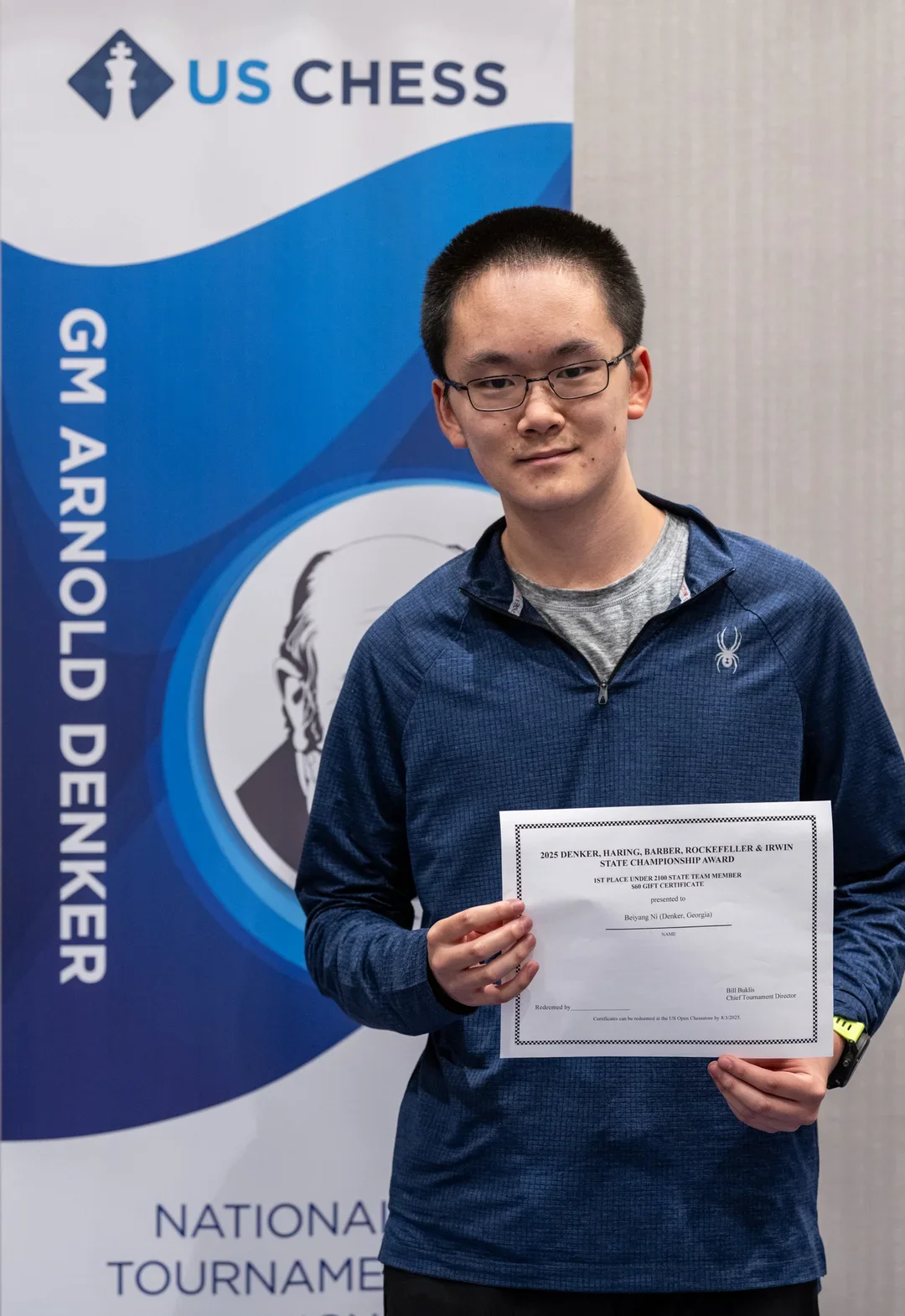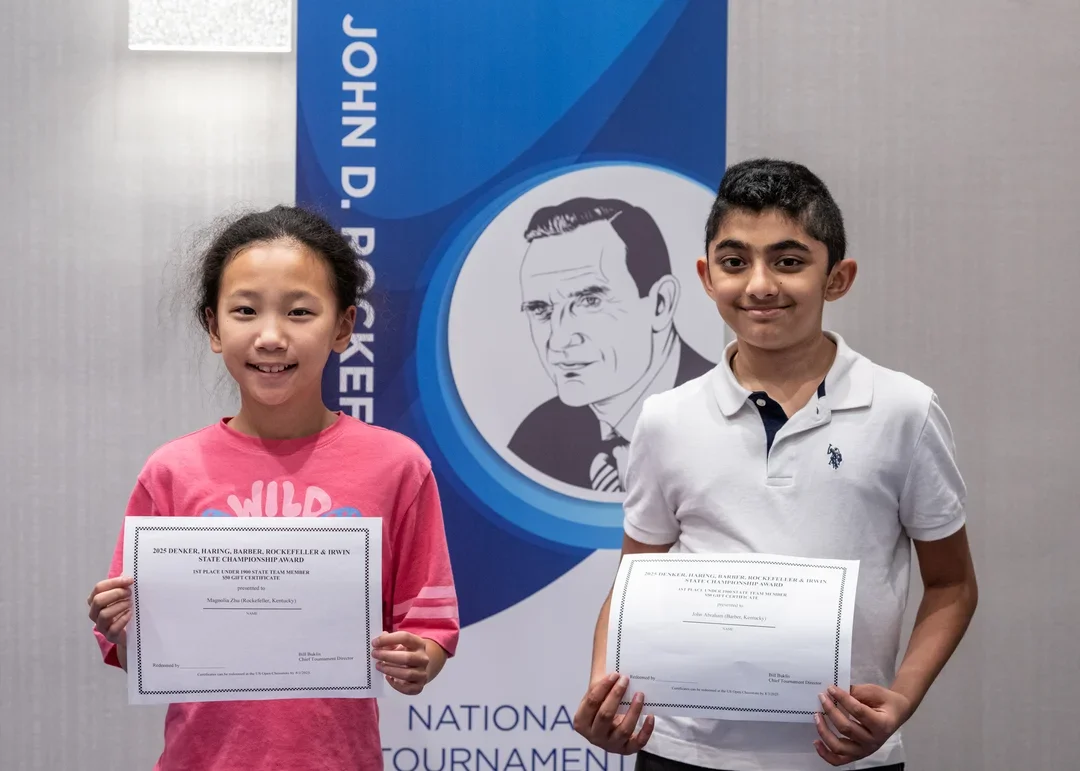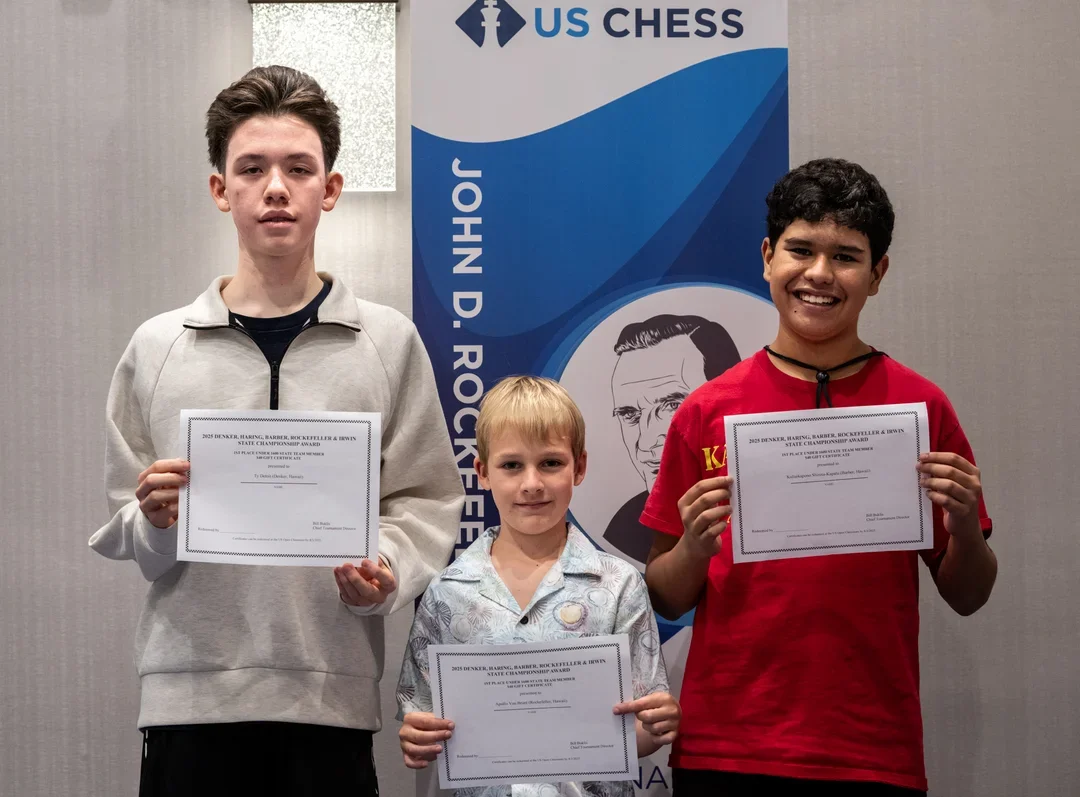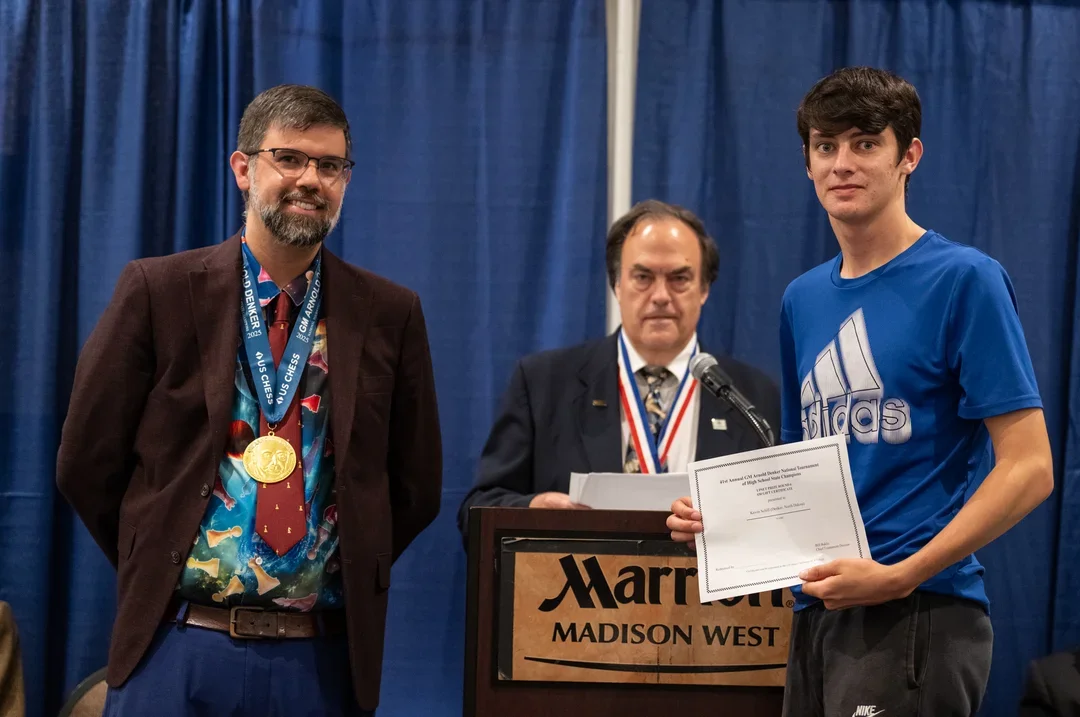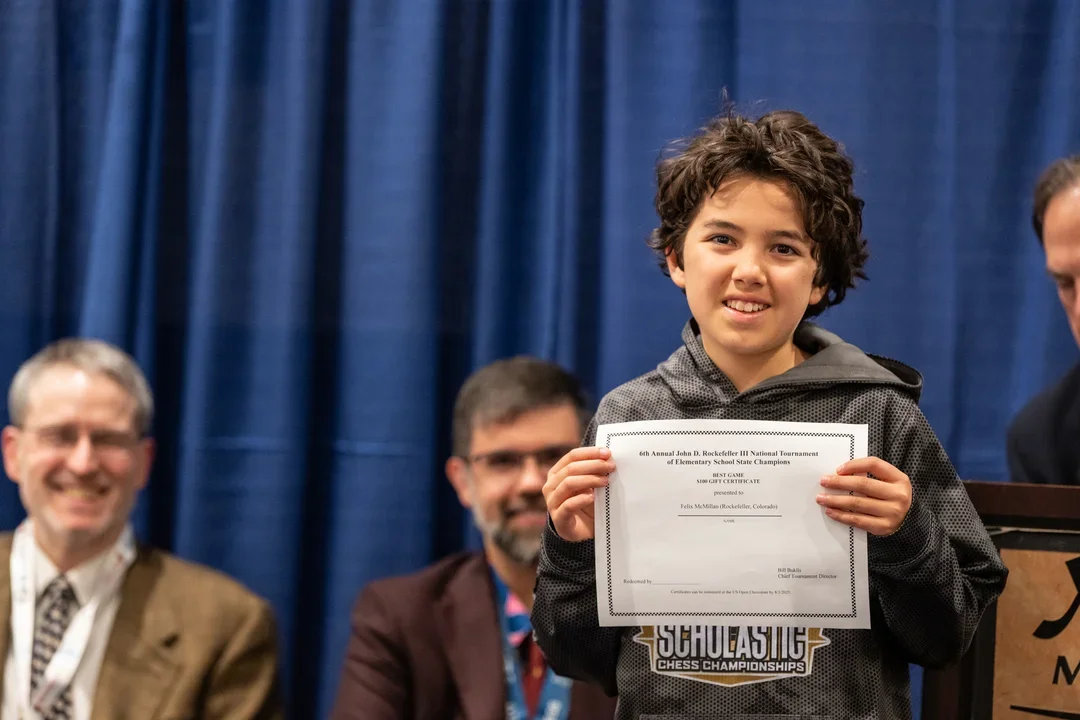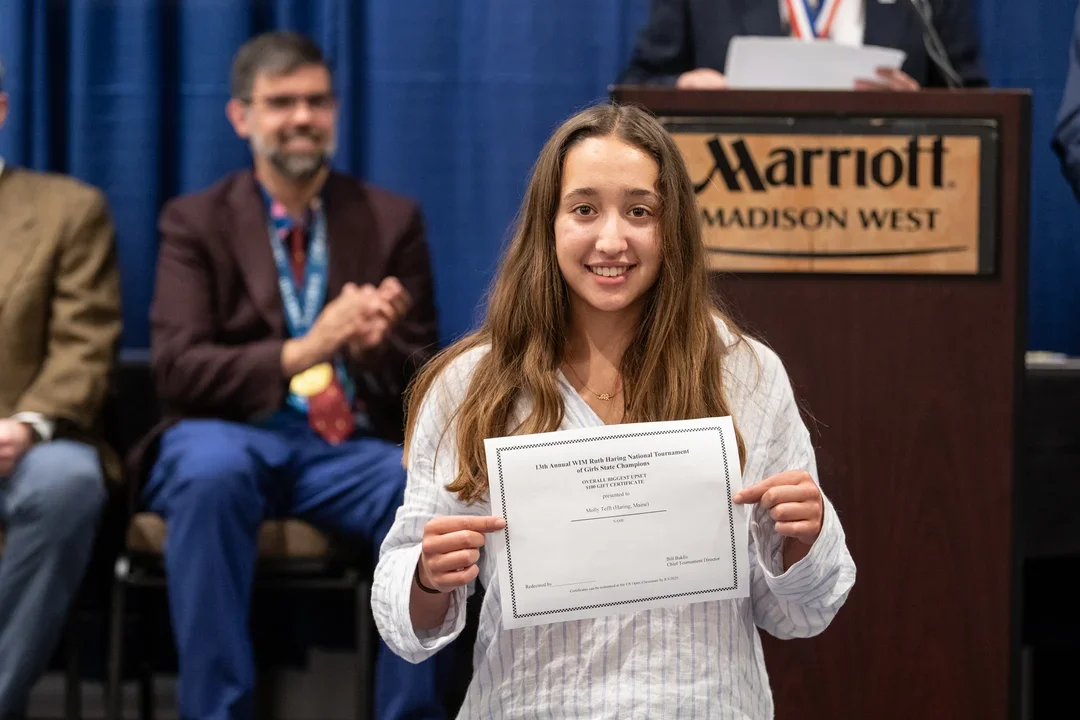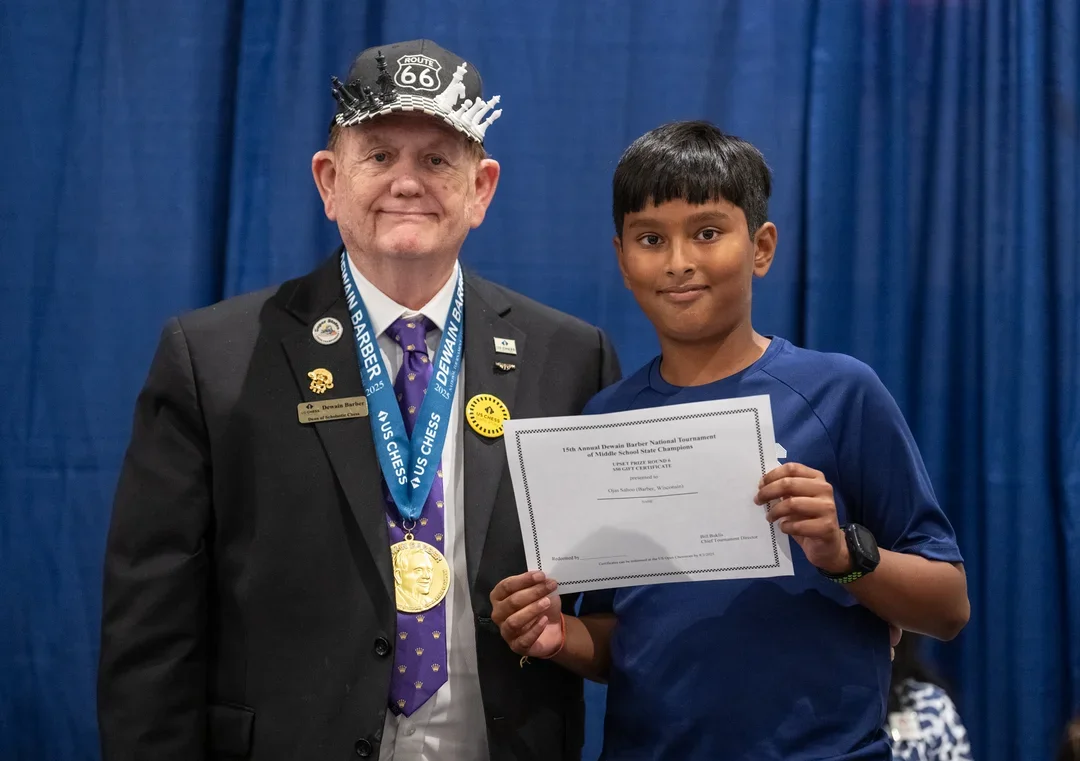The five 2025 national invitational tournaments of state champions came to a close Thursday, with prize money and scholarships on the line. Texas won the prize for top state in the combined standings, finishing ahead of three teams with average ratings over 2200. Find out more about the invitationals’ prize funds prize funds and results.
In today’s final recap from the invitationals, enjoy a final batch of key positions selected by commentator WGM Sabina Foisor, who returns to our Twitch channel tonight at 7 p.m. for Round 7 of the U.S. Open.
Irwin

GM Alexander Fishbein (TN) and IM Stuart Rachels (AL) are our Irwin co-champions.
Coming into the last round with a half-point lead, Fishbein happily claimed a draw by repetition against FM Robby Adamson (AZ) to clinch at least a share of first. Rachels clearly understood what was at stake, opting for an interesting pawn sacrifice not long after Fishbein and Adamson shook hands. One defensive inaccuracy from FM Gregory Markzon (NJ) was all it took for Rachels to win in just 24 moves.
Fishbein claimed the Irwin title — his third — on tiebreaks ahead of Rachels, but the Irwin cash prizes are split equally (as opposed to scholarships in the other invitationals, which are awarded on tiebreaks), so each winner took home $2,000.
Adamson finished with the best tiebreaks of the five players to finish with 4½/6, ahead of (in order) IM Timothy Taylor (CA-N), IM Alexander Matros (SC), GM Melikset Khachiyan (CA-S), and IM Oladapo Adu (DC). Each took home $380.
Below are the final moments from Khachiyan’s and Matros’s victories:
Finishing eighth with a 4/6 score, Markzon won the $500 Irwin Special Senior Chess Award as the top player age 75 or older.
Denker
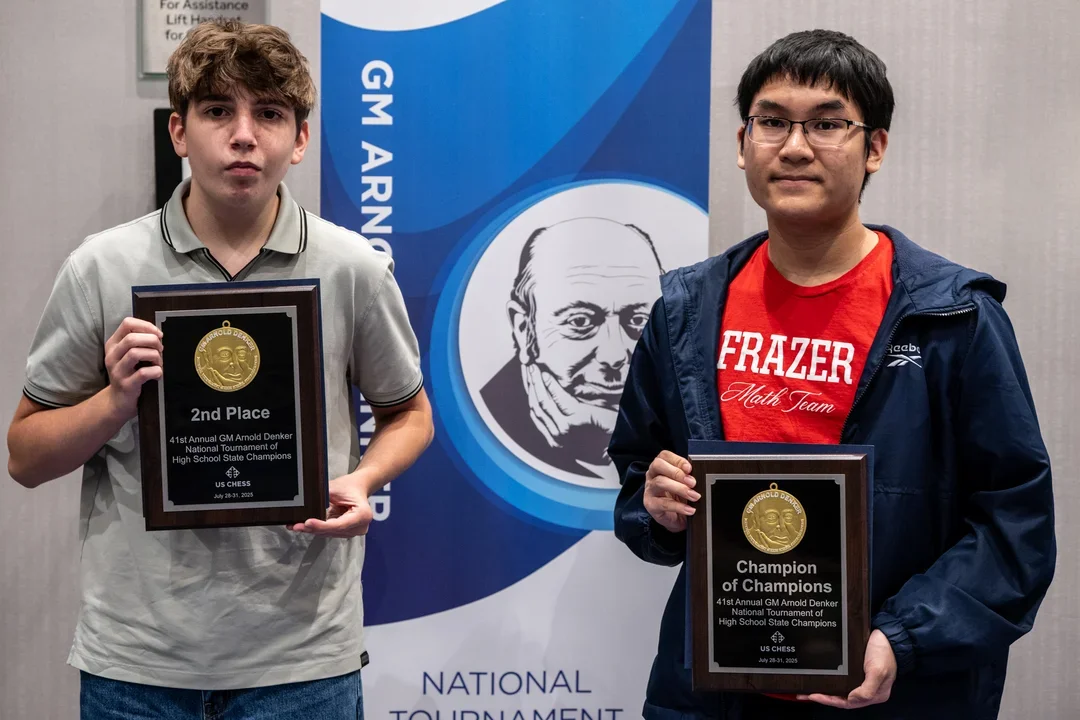
As with the Irwin, the sole leader of the Denker Tournament of State High School Champions took a draw on Board 1 in the last round, while the winner on Board 2 claimed a share of the title. In this case, it was IM Bach Ngo (FL) taking a draw as Black against FM Isaac Wang (CA-S) while IM Liam Putnam (NY) defeated Steve Wongso (AZ).
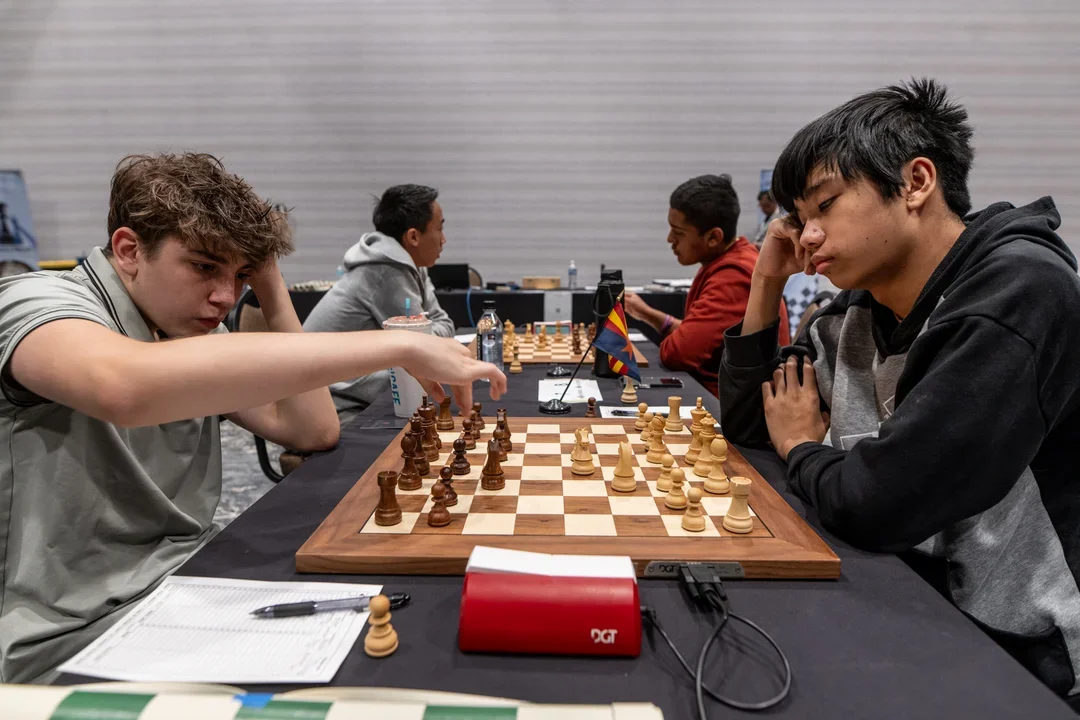
While Wang and Ngo shook hands relatively quickly, Wongso – Putnam was one of the tournament’s last games to finish. Putnam won a pawn just after move 40, but Wongso’s accurate, active defense in the queen-and-pawn endgame looked like it would be rewarded with a draw for the next 30 or so moves. But, perhaps feeling the pressure on his clock with only two minutes to Putnam’s eight, Wongso made the game’s only error and it was all Putnam needed.
Ngo finished first on tiebreaks ahead of Putnam; each player earned $650 cash, but Ngo earned a $5,000 scholarship to Putnam’s $4,000. Three players tied for third through fifth places, each earning $300 in cash. As for the scholarship prizes, Wang earned $3,000 for finishing third, FM Vishnu Vanapalli (NC) $2,000 for fourth, and IM Eric Liu (TX) $1,000 for fifth. Vanapalli’s win over one of last year's co-champions is included below:
Wang also won the $500 Ursula Foster Memorial Award as the top-finishing player under age 16. Ty Dutoit (HI) won the $100 class prize as the top player rated under 2000, finishing with 3½/6.
Haring
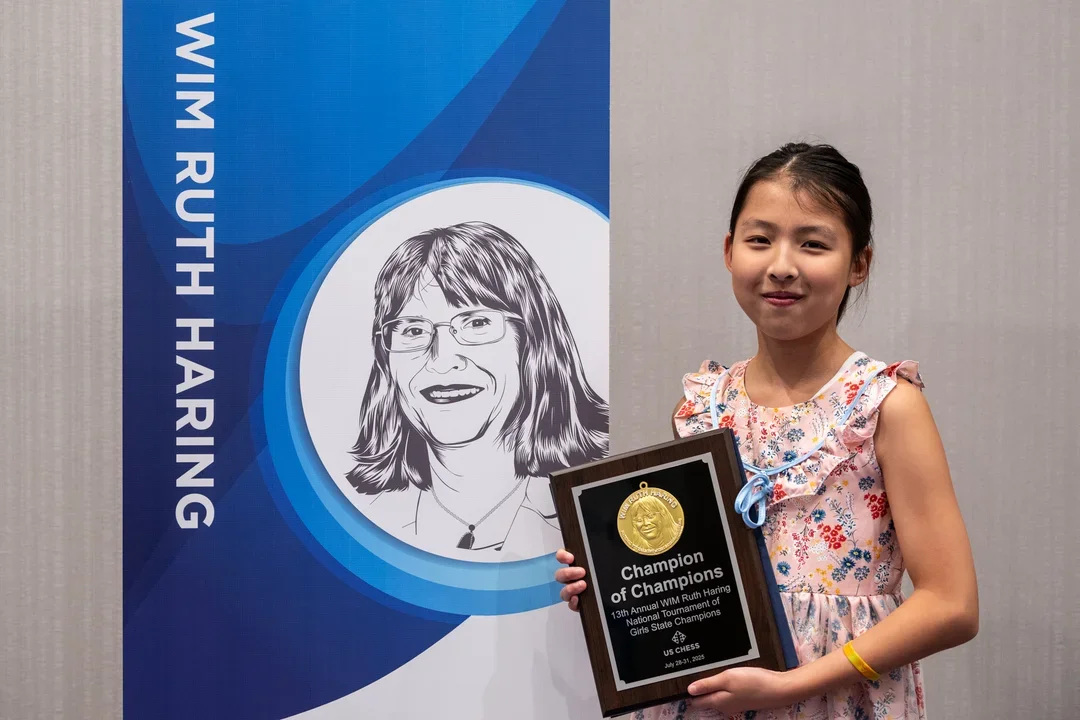
The Haring was the only invitational out of the five to begin the final round without a clear leader, yet WFM Irene Fei (IA) emerged Thursday afternoon as one of only two clear winners.
With co-leaders WIM Omya Vidyarthi (CA-N) and FM Megan Paragua (NY) agreeing to a 12-move draw on the top board, Fei was in a position to claim outright first with a win, while her opponent, WCM Khanim Ismayilova (VA), would join Vidyarthi and Paragua atop the standings with a victory.
At first, it looked like Ismayilova was primed to take advantage of the quick handshake on the top board, building a serious advantage against Fei. Unfortunately for Ismayilova, she was already down to around five minutes on her clock (against Fei’s 30) when her initiative started to build. She was under a minute by the time her advantage started to slip on move 39, and did not have enough time to correctly solve the problem of Fei’s advanced c-pawn.
Fei will take home $800 cash for her victory in addition to a $5,000 scholarship. Paragua and Vidyarthi each earned $450 for their share of second and third place, with Paragua winning the $4,000 scholarship on tiebreaks and Vidyarthi earning $3,000.
Yangyang Shen (TX) and Rebecca Cortez (IL) finished tied with 4½/6 scores, earning $250 each. Shen finished fourth on tiebreaks, winning the $2,000 scholarship, while Cortez won a $1,000 scholarship for fifth.
Diya Balamurgan (SC) won the $500 Ursula Foster Memorial Award as the top player under age 16, finishing with a 3/6 score. Mansi Adduri (NE) won $100 as the top player rated under 1600.
Barber
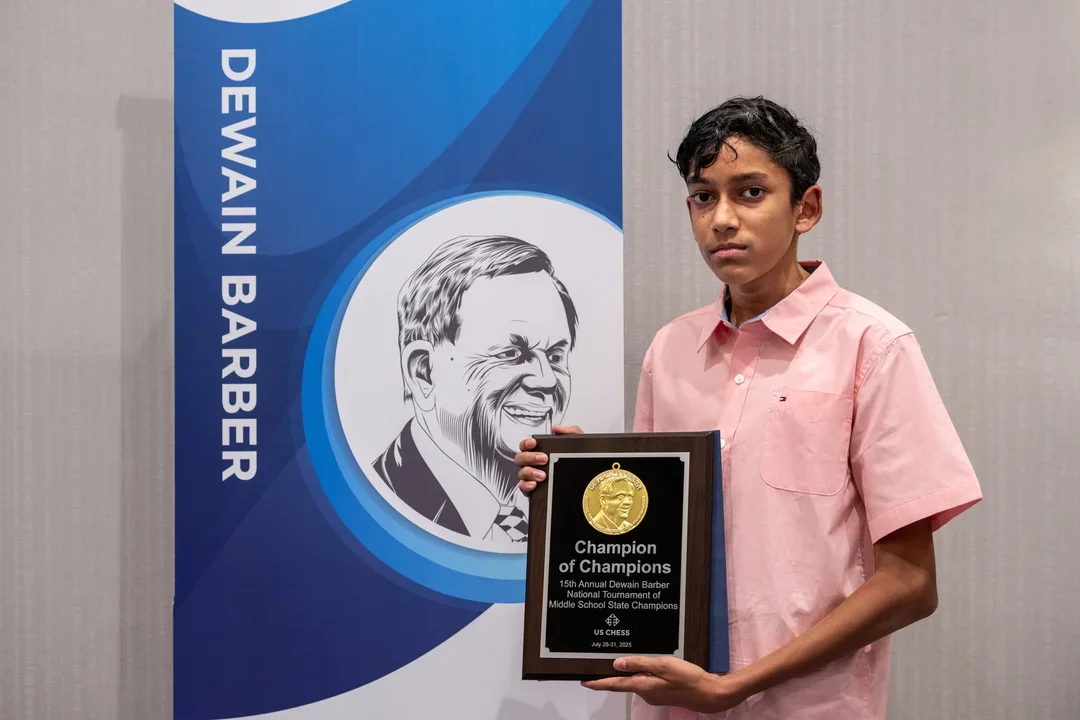
Siddharth Singh (TX) won the Barber by defeating Elliott Goodrich (NY) with the black pieces to claim clear first, a half-point ahead of Andrew Wu (NC), who finished in clear second after beating Oscar Izzy Williams (FL) on Board 2.
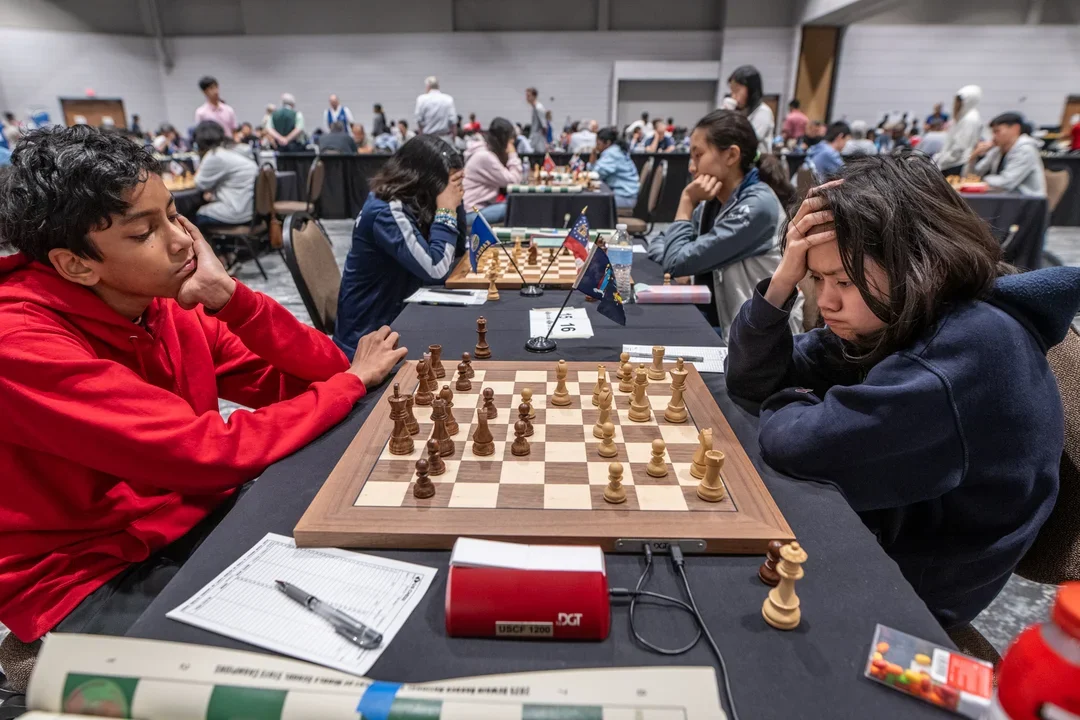
Singh earned $800 cash for his victory on top of the $5,000 scholarship. Wu finished in clear second with a 5/6 score, earning $500 cash and a $4,000 scholarship. Kyle Zhuang (VA) and John Abraham (KY) finished third and fourth, respectively, on tiebreaks, each winning $350 cash with Zhuang also winning the $3,000 scholarship to Abraham’s $2,000.
Eight players tied for fifth, each winning $100 cash as per the regulations. But only one could win the final $1,000 scholarship, and on tiebreaks it went to CM Bobby Qian (NJ).
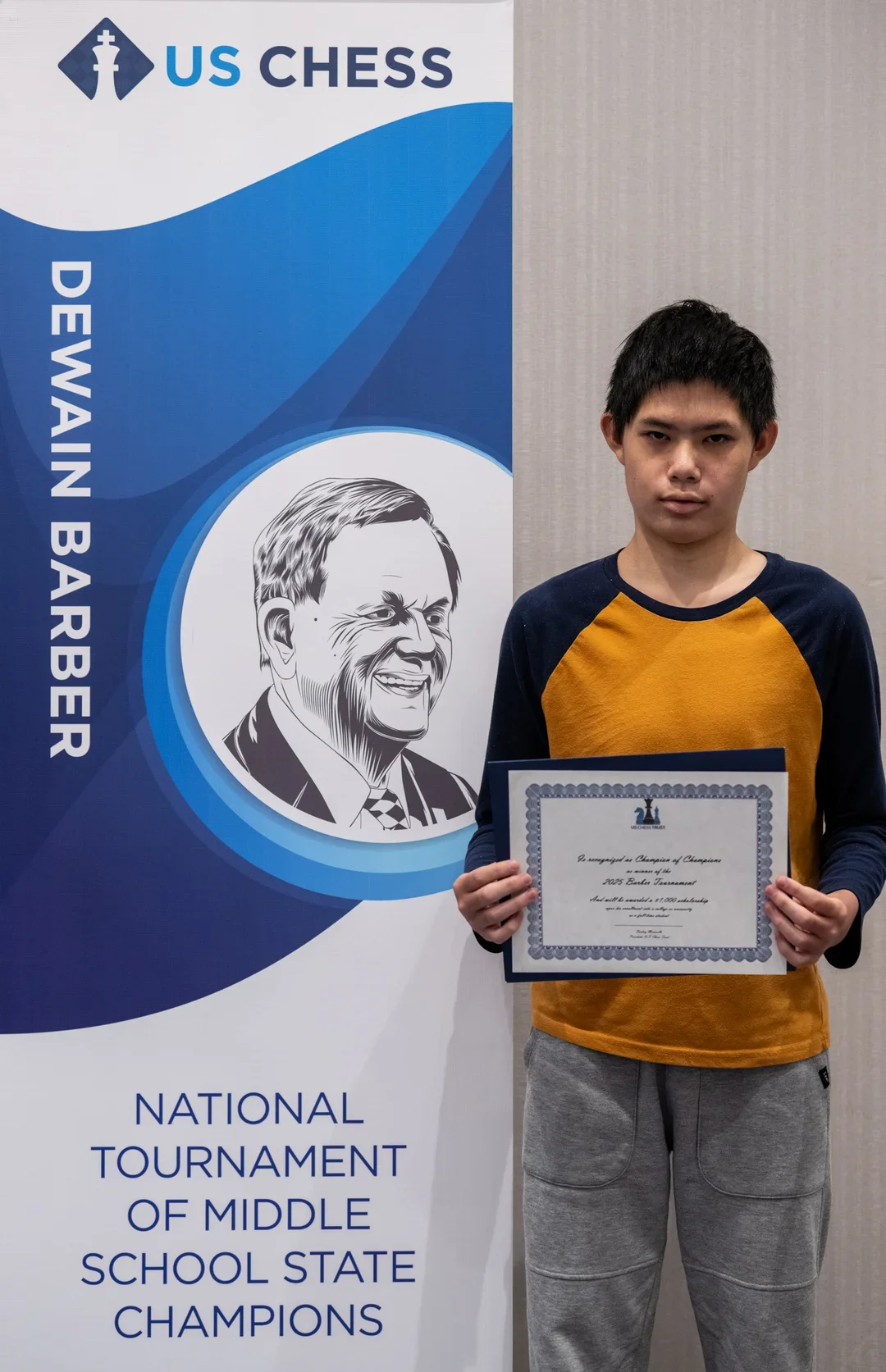
Pratheek Madasu (DE) won the class prize as the top under 1600 player, and Abraham also won the $500 Barber 11 and Under Chess Award.
Rockefeller
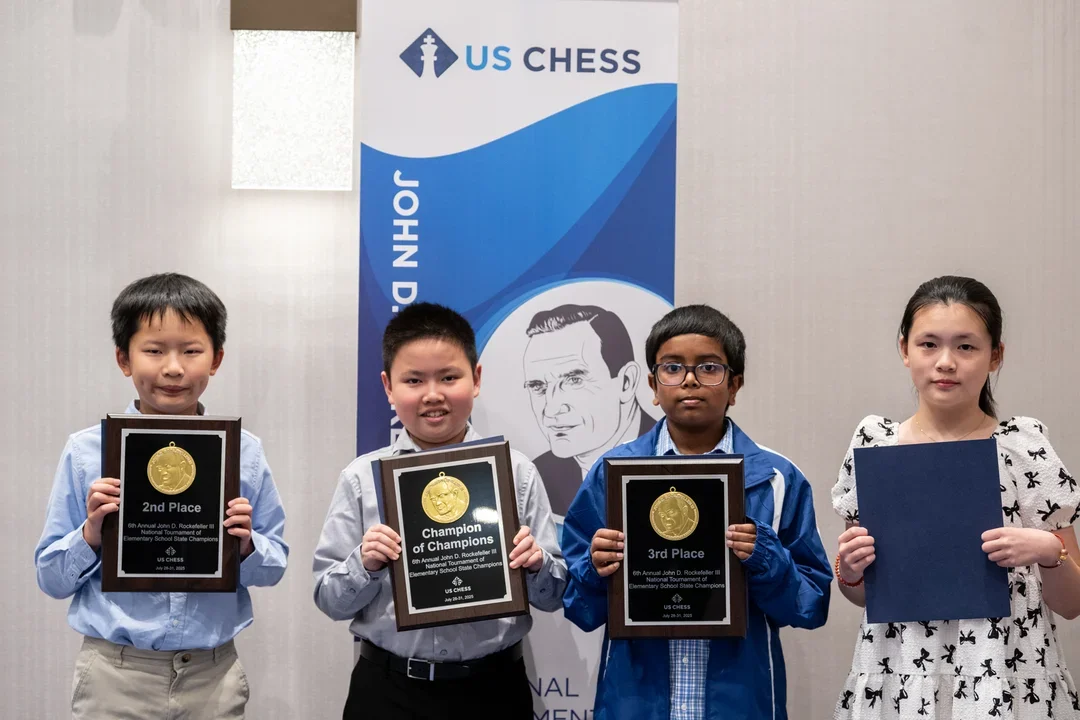
Remember how the Rockefeller had seven players tied for second entering the final round? Well, after FM Ted Wang (WA) found himself in a little hot water against Shawn Xu (MA), the leader seemed happy to escape with a draw after reaching an even position.
This opened the floodgates, with as many as three additional players capable of tying Wang’s 5/6 score, depending on whether Boards 2 through 4 produced any decisive results.
With three decisive results on those boards, FM Linxi Zhu (NY), Santhosh Ayyappan (NJ), and WFM Aimee Yang (PA) joined Wang as our Rockefeller co-champions. In tie-break order, that’s Zhu, Wang, Ayyappan, and Yang. Each player won $500 cash, with first through fourth on tie-breaks earning $5,000, $4,000, $3,000, and $2,000 respectively. Zhu’s victory is below:
Only two players tied for fifth with 4½/6 scores: Xu and Aiden Linyuan Li (IL). Each earned $100 cash, and Xu won the $1,000 scholarship on tiebreaks.
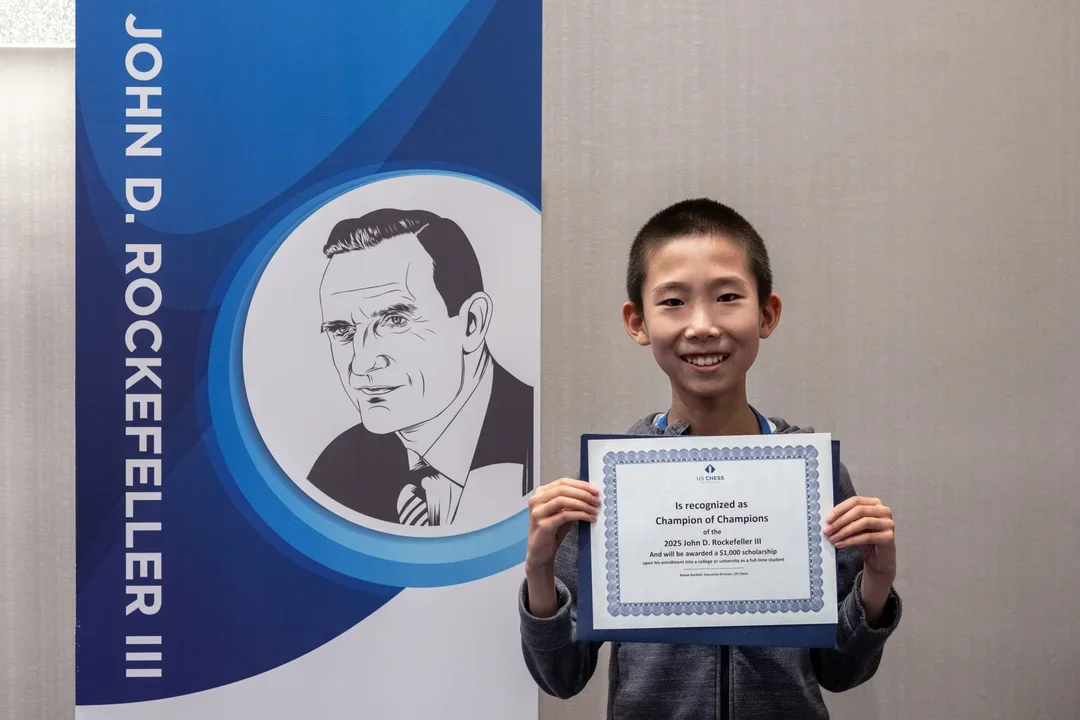
While missing out on the scholarship, Li did pocket the $500 Rockefeller 8 and Under Chess Award. As the top player rated under 1500, Kanishk Malli (AR) won the class prize.
Team Standings
Finishing with a combined 21½/30 score, the Texas team was led by Barber champion Singh’s 5½/6 score. But whether it’s chess or college football, any Texan will tell you that roster depth is just as important as star power.
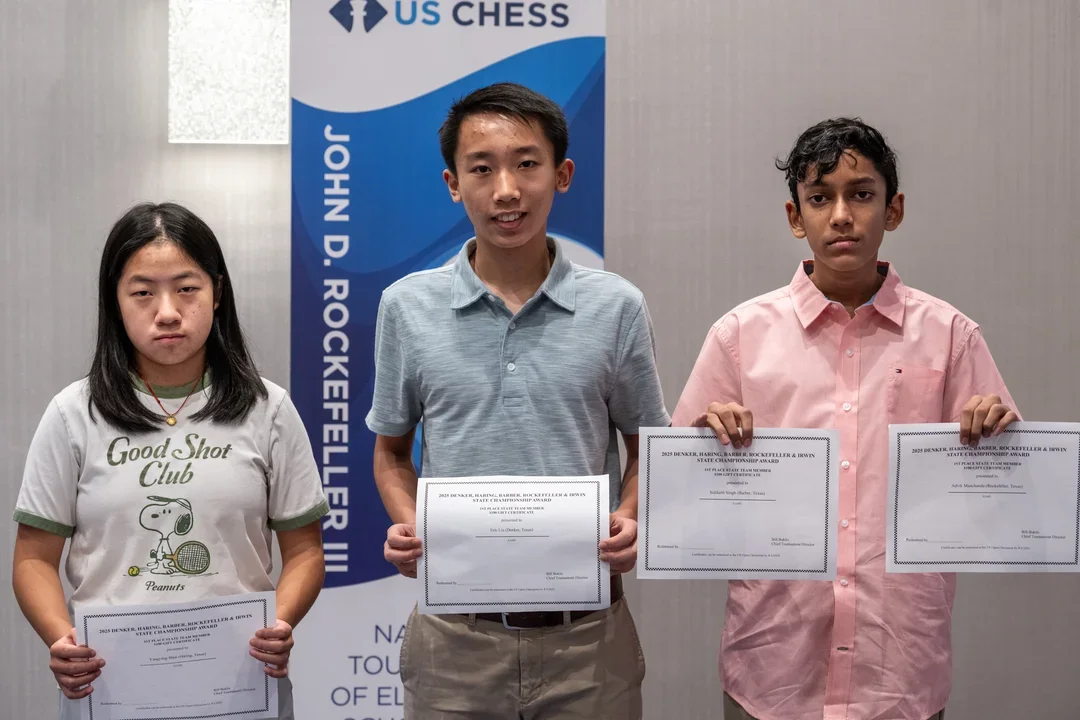
Three more Texans finished in the top tens of their respective tournaments, with Liu (Denker, fifth) and Yangyang Shen (Haring, fourth) each contributing 4½/6 scores. To round out the roster, Advaik Manchanda’s 4/6 score in the Rockefeller earned him a share of seventh, and Scott Alan Elliott’s 3/6 finish in the Irwin was just enough to edge out the four teams that each finished with 21/30 combined scores: in tiebreak order, Northern California, Southern California, New York, and North Carolina.
Each Texan earned a $100 gift certificate to the U.S. Open Chess store, with $80 gift certificates going to each Northern Californian and $75 certificates going to each Southern Californian.
As for the class prizes, Georgia won a set of $60 certificates for being the only under 2100 team to tie for eighth, with an 18½/30 score. Kentucky won the under-1900 set of $50 certificates for its 17½/30 finish, and Hawaii’s 12½/30 finish was good for the under-1600 prize of $40 certificates. With an average rating of 1427.6, Hawaii’s showing was particularly impressive.
At the awards ceremonies, prizes were also awarded for upsets and best games; a complete list of these prizes will be available soon.
Open
Tonight is the night for the Middleton merge, with the seven-day, five-day, and four-day schedules all coming together for three rounds of classical chess beginning tonight at 7 p.m. CDT.
Those competing in the seven-day schedule have a full day to sit in on committee meetings, compete in the final daily quad, or explore the local mustard museum. After six rounds, GMs Joshua Friedel (MI) and Varuzhan Akobian (MO) are the only players with 6/6. Indian GM Harsha Bharathakoti is the only player with a 5½/6 score, while 12 more players loom with 5/6 scores.
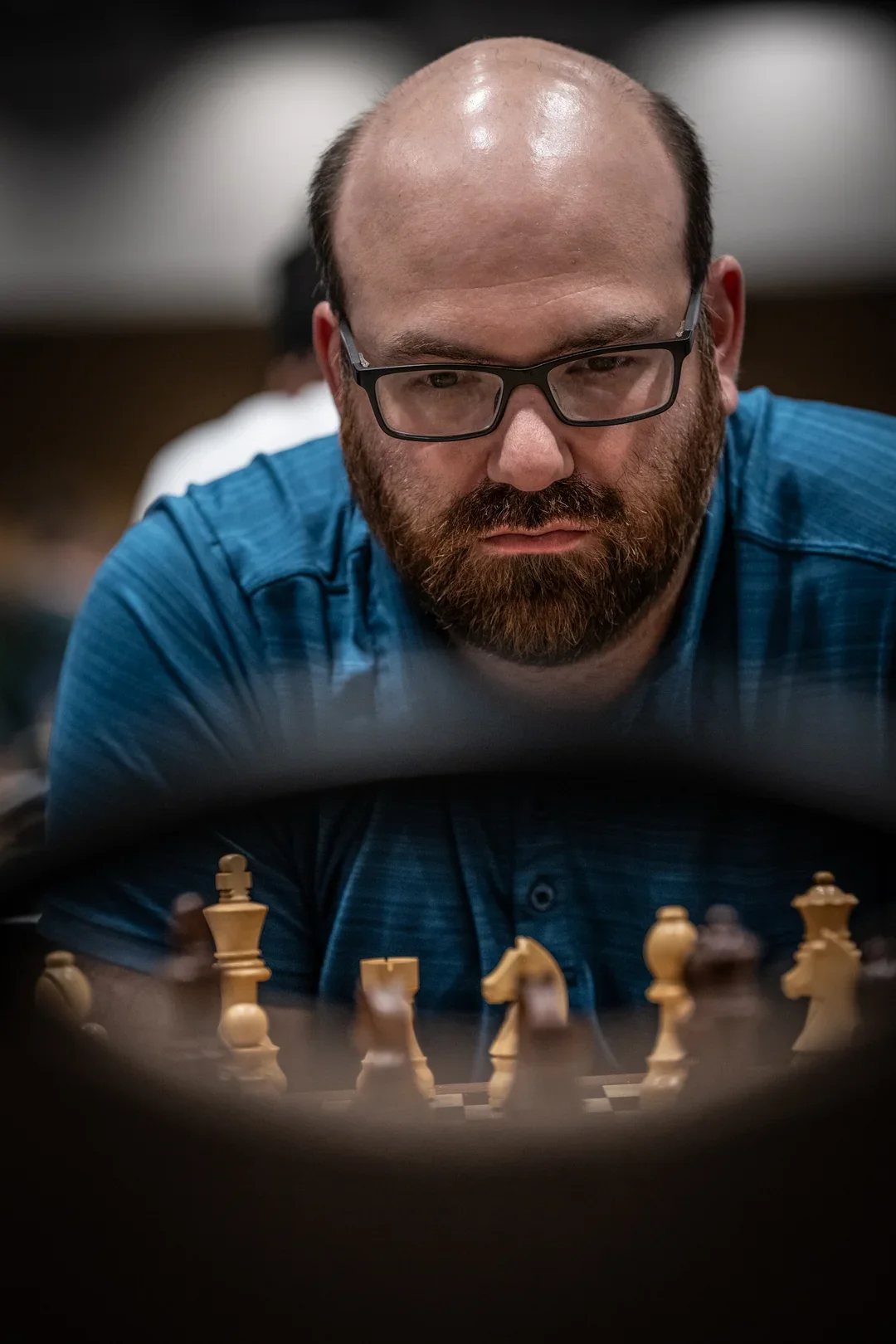
Friedel defeated reigning U.S. Open co-champion GM Jianchou Zhou with an effective attacking plan in a Queen’s Gambit Declined, while Akobian capitalized on the winning chances he created from the black side of a sharp French Defense.
The sixth round of the five-day schedule began at noon, with the players switching from the G/90,D/5 time control used for their first five rounds to the 40/100, SD/30, Inc/30 time control that all players will use the rest of the weekend. Through five rounds, only IM Sam Schmakel (NY) and Trevor Magness (WI) are still perfect; Schmakel has the white pieces in their head-to-head encounter.
After four rounds in just over 12 hours yesterday, the four-day schedule boasts only three unblemished scores headed into round five. Of 154 entrants, only GMs Andrew Hong, Dariusz Swiercz, and Viktor Matviishen made it through unscathed. Seven more players — including GMs Tanguy Ringoir and Praveen Balakrishnan — trail the leaders with 3½/4 scores. But the sixth GM in the field is further back with only three points, as GM Daniel Naroditsky was upset by Nathaniel Philip Moor (2363) of Connecticut, who turns 21 this year.
Readers of yesterday's report might catch that this field of 154 players is almost double the size of yesterday's 88 pre-registered list. Did 66 people really wake up Thursday morning and decide to register on a whim? While that would be a wonderful world to live in, the influx of players came from two main sources: re-entries and the invitationals.
Players unhappy with their scores in the seven- or five-day schedules had the option of re-entering in the four-day. I suppose players happy with their scores but trying to maximize the number of classical games they played could re-enter, as well.
Players competing in the invitationals are able to enter in the Open for a discounted rate, but they had to register on site to use the discount. While many of these participants planned to play in the four-day all along, they probably did not get around to registering until their other tournament ended!
More than 50 players competed in Thursday’s quads, and those who are looking for even more chess this weekend have their choice of side events tailored for players of all ages and playing speeds.
Today’s US Chess Awards ceremony is open to all, with the reception at 4 p.m. CDT in the Atrium.
Categories
Archives
- January 2026 (10)
- December 2025 (27)
- November 2025 (29)
- October 2025 (39)
- September 2025 (27)
- August 2025 (29)
- July 2025 (43)
- June 2025 (25)
- May 2025 (24)
- April 2025 (29)
- March 2025 (29)
- February 2025 (20)
- January 2025 (24)
- December 2024 (34)
- November 2024 (18)
- October 2024 (35)
- September 2024 (23)
- August 2024 (27)
- July 2024 (44)
- June 2024 (27)
- May 2024 (31)
- April 2024 (51)
- March 2024 (34)
- February 2024 (25)
- January 2024 (26)
- December 2023 (29)
- November 2023 (26)
- October 2023 (37)
- September 2023 (27)
- August 2023 (37)
- July 2023 (47)
- June 2023 (33)
- May 2023 (37)
- April 2023 (45)
- March 2023 (37)
- February 2023 (28)
- January 2023 (31)
- December 2022 (23)
- November 2022 (32)
- October 2022 (31)
- September 2022 (19)
- August 2022 (39)
- July 2022 (32)
- June 2022 (35)
- May 2022 (21)
- April 2022 (31)
- March 2022 (33)
- February 2022 (21)
- January 2022 (27)
- December 2021 (36)
- November 2021 (34)
- October 2021 (25)
- September 2021 (25)
- August 2021 (41)
- July 2021 (36)
- June 2021 (29)
- May 2021 (29)
- April 2021 (31)
- March 2021 (33)
- February 2021 (28)
- January 2021 (29)
- December 2020 (38)
- November 2020 (40)
- October 2020 (41)
- September 2020 (35)
- August 2020 (38)
- July 2020 (36)
- June 2020 (46)
- May 2020 (42)
- April 2020 (37)
- March 2020 (60)
- February 2020 (38)
- January 2020 (45)
- December 2019 (34)
- November 2019 (35)
- October 2019 (42)
- September 2019 (45)
- August 2019 (56)
- July 2019 (44)
- June 2019 (35)
- May 2019 (40)
- April 2019 (48)
- March 2019 (61)
- February 2019 (39)
- January 2019 (30)
- December 2018 (29)
- November 2018 (51)
- October 2018 (45)
- September 2018 (29)
- August 2018 (49)
- July 2018 (35)
- June 2018 (31)
- May 2018 (39)
- April 2018 (31)
- March 2018 (26)
- February 2018 (33)
- January 2018 (30)
- December 2017 (26)
- November 2017 (24)
- October 2017 (30)
- September 2017 (30)
- August 2017 (31)
- July 2017 (28)
- June 2017 (32)
- May 2017 (26)
- April 2017 (37)
- March 2017 (28)
- February 2017 (30)
- January 2017 (27)
- December 2016 (29)
- November 2016 (24)
- October 2016 (32)
- September 2016 (31)
- August 2016 (27)
- July 2016 (24)
- June 2016 (26)
- May 2016 (19)
- April 2016 (30)
- March 2016 (36)
- February 2016 (28)
- January 2016 (32)
- December 2015 (26)
- November 2015 (23)
- October 2015 (16)
- September 2015 (28)
- August 2015 (28)
- July 2015 (6)
- June 2015 (1)
- May 2015 (2)
- April 2015 (1)
- February 2015 (3)
- January 2015 (1)
- December 2014 (1)
- July 2010 (1)
- October 1991 (1)
- August 1989 (1)
- January 1988 (1)
- December 1983 (1)


